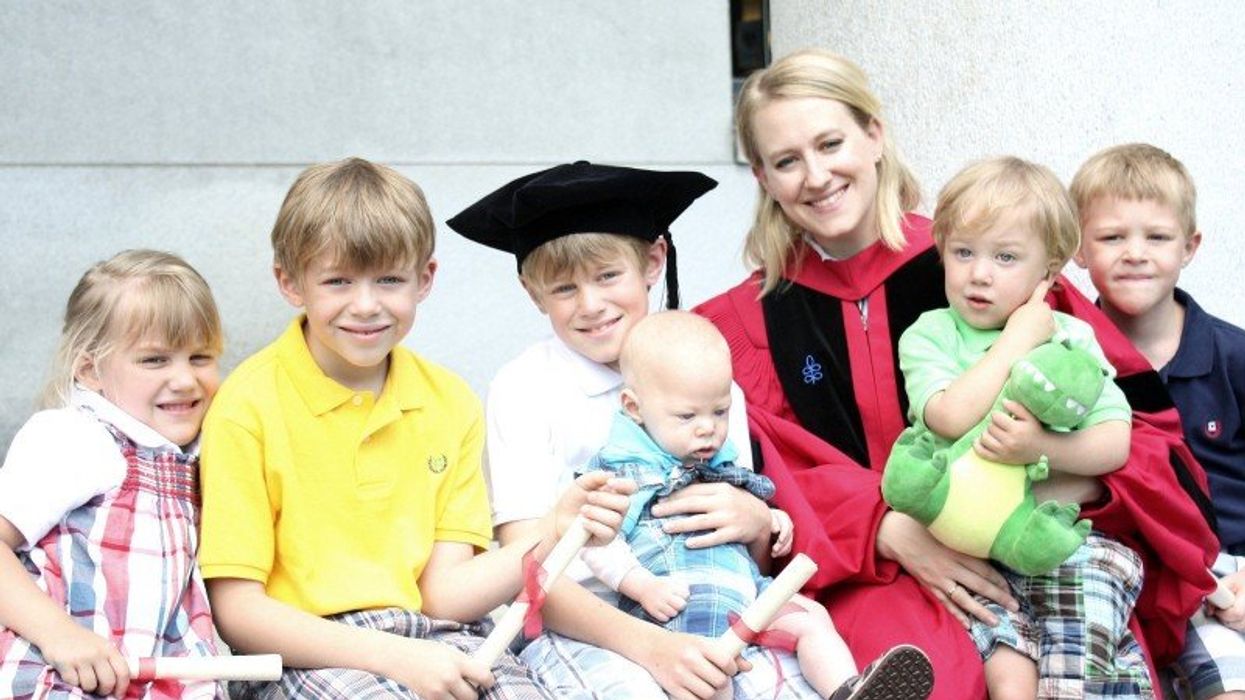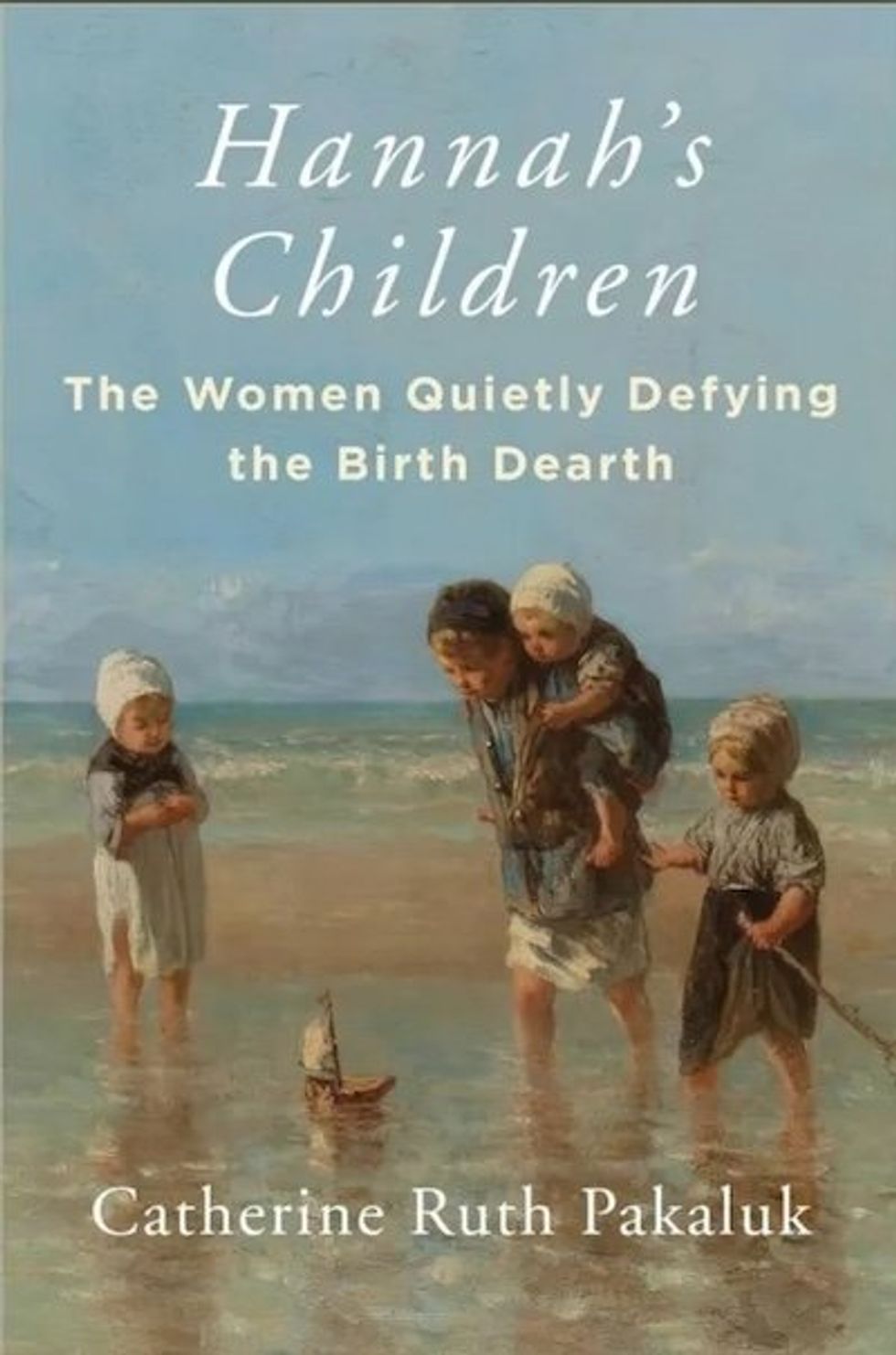
Catherine Ruth Pakaluk

Author Catherine Ruth Pakaluk tells Align why — and how — some women are choosing big families.
In the midst of a historic "birth dearth," why do some 5% of American women choose to defy the demographic norm by bearing five or more children?
Catherine Ruth Pakaluk’s recent book, "Hannah’s Children: The Women Quietly Defying the Birth Dearth," is a compelling portrait of these overlooked but fascinating mothers, women who, like the biblical Hannah, see their children as their purpose, their contribution, and their greatest blessing.
"After three it gets easier because your older kids organically start to help, and you get better at what you’re doing. That’s a message few people hear. Five kids aren't five times harder than one."
Pakaluk is an associate professor of social research and economic thought at Catholic University and came onto "Girlboss, Interrupted" this week to talk about her (literally) vital work.
Herself the mother of eight, Pakaluk traveled across the United States and interviewed 55 college-educated women who were raising five or more children. Through open-ended questions, she sought to understand who these women are, why and when they chose to have a large family, and what this choice means for them, their families, and the nation.
In this exclusive interview for Align, Pakaluk elaborates on the challenges declining birth rates pose to society and what can or should be done to help.
Align: Why did you write this book? What do you hope that your work will do to add to or change the conversation around motherhood in America?
Catherine Ruth Pakaluk: Super low birth rates mean a future of economic stagnation — as the supply of workers and ideas slows down, political instability, as government revenues shrink, fraying social ties, as people grow up with fewer siblings and extended family. All these worries are coming to the surface in the national dialogue — and everyone wants to know: What will it take to reverse the trend? Can we incentivize women and families to have more babies?
But the conversation has totally overlooked the most important point of all: If people want children, why do they want them? What makes children and motherhood valuable? Are children worth wanting for their own sakes and not only as they fit into adult needs?
I wrote this book to put the question of the desirability of children front and center. We will not reverse the trend of low birth rates until we face that question. So I hoped my work would move us to talk more about the value of motherhood.
Align: Do you think that family life has been intentionally devalued? Cui bono?
CRP: Hard question. Of course, all kinds of things get devalued unintentionally when the comparison set changes. How valuable is this "compared to what"? Shiny new things come along. Apple watches devalued analog watches. The contraceptive revolution — the pill (in 1960) with legal abortion as backup — initiated the largest shift of mothers into the non-domestic workforce in history. I don’t think people thought of reproductive control as devaluing family life — but it fundamentally changed the choice set.
Before the pill, the alternative to having children would have been a lot of abstinence or forgoing marriage. After the pill, alternatives to having children included marriage, and — if you wanted it — more education and a job. All without a life of abstinence.
The pill changed the "compared to what" for family life, and many women, then and now, want some of that new "comparison" option. To the extent that higher education and jobs became viable for women — to that extent family life was "devalued." All of this can be true without any intentional plan to devalue motherhood.
We know that some technologies can be individually rational, that is, any single person feels better off using it — but as a group it puts the whole in a worse place. We’re starting to wonder if smartphones are like this — none of us wants to give one up personally, but overall we’re more anxious, depressed, and socially mixed up. Our kids may be suffering most of all. That’s a collective action problem. Looking back, the pill may be something like that — a rational choice for any one woman, but a bad deal when we’re all in. The pill initiated a shift to where a life dedicated to raising children no longer looks as valuable.
Separately, I do think powerful evil forces — principalities and powers — have worked to devalue human life in general, because God loves human life. These forces employ unsound economic theories and play on irrational fears that there won’t be enough stuff to go around. This is a longer story, but it reaches back at least two hundred years and includes Marxism, Darwinism, eugenics, Planned Parenthood, and the population bomb rhetoric and global policies. Now, any devaluation of human life per se will cash out as an attack on family life, since the family is the cradle of humanity.

Align: Why did you choose to focus on college-educated women?
CRP: There is a powerful correlation between higher women's education and lower birth rates, observed across countries and over time — so powerful that education is sometimes hailed as “the best contraceptive.” This is the reason why Emmanuel Macron commented about getting more education for girls in Africa, since “perfectly educated” women wouldn’t go on to have large families. My reply to his statement and my follow-up with a graduation photo inadvertently went viral with the hashtag #postcardsforMacron.
As people struggle to understand the future of fertility in the modern world, the perceived tension between women’s education and sustainable birth rates will be front and center. Some on the right are taking aim at women's education itself, asking if that’s the turn that takes us to below replacement fertility.
I don’t think that’s the story — but unpacking why that isn’t the story required talking to women with college degrees who seem to "defy" the trend. So that’s what I did. Their tale provided a counter-narrative — one in which the value of children takes center stage.
There’s a risk, of course, that some readers will wonder if I interviewed college-educated women because I think college degrees are ideal for women or for people. I didn’t, and I don’t. I actually tend to think too many men and women go to college today — but that's a subject for another time.
Align: Can you address the popular notion that having kids ruins one’s life? Did any of your case studies talk about this idea or mention how they deal with the real difficulties that children can introduce?
CRP: Lol. Absolutely! It came up in lots of ways — throughout the interviews. The short answer was something like — “of course, kids do ruin your life!” But what they ruin is life as you knew it. On the other side you get a new life, one you don’t know about yet.
You become a mom, the center of the universe for a person who will love you more than you knew it was possible to be loved. You become a heroine, a savior, an angel — the only pair of arms that will answer in the night. You get all this — yes, it wrings you dry sometimes, but it’s worth giving up the old life!
One of the moms said, “When you make a choice, something else dies.” That’s true for whatever you do. Nobody says, well, you became a lawyer, so your life is ruined. But of course, as a lawyer, you can’t sleep till noon or do whatever you want. Those luxuries die. And that’s okay. Anything demanding requires a change in your life — it’s just how much do you want it? Is it worth the change?
Chuong Nguyen, host of the "Unlicensed Philosophy" podcast (based in Budapest, Hungary) told me that his father used to say (and I’m paraphrasing): "The man I am today was born the day you were born." I really love that. I think that’s the way to think about it.
There are plenty of stories in the book about how women process the everyday difficulties. One of the main lessons — mothering little ones gets harder up to a point, maybe three kids. But after three it gets easier because your older kids organically start to help, and you get better at what you’re doing.
That’s a message few people hear. Five kids aren't five times harder than one. It’s actually a lot easier than having one — in terms of the lifestyle challenge.
Align: What do you think it will take for America to reverse its low fertility rates, leaving aside the question of immigration?
CRP: To reverse the low fertility trap, more women and men have to come to view children as blessings — expressions of God’s goodness, rather than as something like a consumer good you weigh against other goods in your life.
If kids are in the latter category, we tend to fit them into an ever-expanding set of things we want to have or do, and kids get a smaller and smaller share of time in adult lives. But when they’re in the former category, seen as blessings, they become something of first rank, something we order our lives around and make sacrifices for.
My work suggested that to reverse the birth rate, it won’t be enough to nudge people who see children as consumer goods into an extra child or more. We’ll need more of the people who see children as blessings and lovingly have three, four, or more children.
Israel has a stable above-replacement birth rate today because it has a higher percentage of devout Jews with larger families. That can be our future too. To get there, we need to pass legislation to allow all families to spend their tax dollars on religious and church-based schools where biblical values are nourished and protected.
We also need to pursue all other avenues to widen the impact of living religious communities — this generally means the state taking a step back and letting churches grow stronger by doing more: more charitable work, more youth work, more health care work, and more social assistance work.